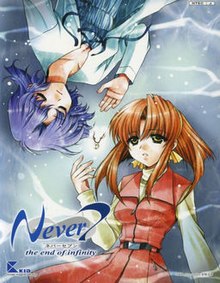| Never 7: The End of Infinity | |
|---|---|
 Cover art, featuring Izumi (top) and Yuka (bottom) | |
| Developer(s) | KID |
| Publisher(s) | KID, Cyberfront, 5pb. |
| Director(s) | Takumi Nakazawa |
| Writer(s) | Kotaro Uchikoshi |
| Composer(s) | Takeshi Abo |
| Series | Infinity |
| Platform(s) | PlayStation Neo Geo Pocket Color Dreamcast Microsoft Windows PlayStation 2 Macintosh PlayStation Portable Android iOS |
| Release | |
| Genre(s) | Visual novel |
| Mode(s) | Single-player |
Never 7: The End of Infinity is a visual novel video game developed by KID. It was originally published by KID on March 23, 2000, for the PlayStation as Infinity, and has since been released on multiple platforms. It is the first entry in the Infinity series, and is followed by Ever 17, Remember 11, the spin-off 12Riven, and the reboot Code_18.
The story follows Makoto Ishihara, a college student who attends a seminar camp on an island together with three other students; he also befriends three other people whom he meets on the island. The game takes place over the course of a week, and consists of the player reading the story, occasionally making choices that affect the direction of the plot; on the sixth day, one of the characters dies, and the game moves back in time to the beginning, letting the player use knowledge from the first set of six days to make new choices, to try to prevent the death.
The game was directed by Takumi Nakazawa, planned and written by Kotaro Uchikoshi, and composed for by Takeshi Abo. Uchikoshi included science fiction elements, but was unable to make heavy use of them, as his superiors at KID thought that the game needed to focus on cute female characters in order to perform well commercially. Abo composed music based on his first impressions of reading the game's story, with a focus on its "emotional flow". Because of the science fiction and theoretical themes, he composed what he describes as "geometric music".
RPGFan praised the game for its plot, its intimate scope, and its music, whereas Famitsu found the game's mood boring. As the science fiction elements were well received, later entries in the series gradually moved away from the dating theme and became more focused on science fiction.